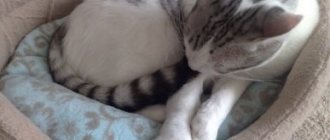“Why does a kitten meow for no reason” is a question that torments many new cats and cats, although the answer is quite simple for experienced breeders.
First you need to understand that cats always meow to attract the attention of a person or a relative. The cat won't just mutter like that. All this also applies to a small kitten, which always needs a reason for meowing, even if it is not always obvious to the owner.
What a kitten's meowing could mean: 6 reasons
All domestic cats in the world speak the same language. In some situations, the cat's voice brings tenderness, in others it irritates. A kitten doesn't just meow. He gives his voice when he wants to communicate, ask or demand something.
Among the reasons that make a cat meow are the following:
- Adaptation to new living conditions. A kitten adapts to coexistence with a person when its mother teaches it. Personality is fully formed when the cub spends up to 100 days of age interacting with its mother and littermates. Even in this case, it takes 2-3 days to get used to the new conditions. When a baby appears in the house, during the daytime he feels increased attention to himself and explores new places. But when night comes and everyone falls asleep, the kitten experiences stress and remembers its mother. He tries to find her and calls her all the time.
- The cat is a solitary night hunter. The biological clock is set for daytime sleep and nighttime activity. If the owners do nothing to coordinate the cat’s life rhythm with theirs, sleepless nights await them.
- The animal slept in the evening, he is bored and wants to play.
- Hunger.
- The animal felt that family members treated him differently. Some household members allow him something, others prohibit him. If there is a row in the family, the pet tries to take advantage of the situation and take a higher place in the hierarchy of the pride.
- The kitten is sick and asks for help.
Be sure to read:
How to give pills to cats correctly - 5 ways
The owner of a kitten needs to learn to understand the language his pet speaks. Act strictly but fairly in order to gain the authority of the dominant individual in the human-cat family.
"Harmless" reasons
If there is no mother and you want to eat
Weaning from mother
During the first days in a new home, the kitten will most likely miss its brothers and mother. The point is not even that he is bored alone, but the banal lack of maternal care. The presence of a mother cat nearby is very important for a baby even at 3 months, so the kitten will need time to adapt.
You can soften the process and speed it up in a simple way - take a toy or a blanket brought in advance from the breeder, which will smell familiar to the baby for some time. Also, do not leave your baby alone for a long time in the first week. Your care and attention will help your baby adapt.
IMPORTANT: when a kitten meows at night due to the absence of its mother, do not take it to bed; later it will be difficult to wean the kitten from sleeping in the same bed with you.
Cold
The mother always warms the kittens, but in a new home the baby may lack her physical warmth.
You can solve the problem by arranging a bed made of natural fabrics like a warm cocoon made of a towel, and for very small kittens you can place a heating pad under the bedding.
Stress from moving
Most often, this reason comes complete with longing for the mother. The space prepared for the baby and the same thing brought from the breeder with a familiar smell helps to smooth out the effect.
Attention and gentle play also help kittens reduce the stress of moving.
IMPORTANT: if there is already another pet in the house, then do not introduce the baby to it every day, let the kitten first get used to the very fact of changing housing, and then get acquainted with the neighbors.
Hunger
Most often, hungry cats demand food by meowing. Kittens are no exception in this matter. Up to 8 months, all kittens are on fractional meals, so it is not surprising that once every 3 hours the baby becomes hungry again, and a rumbling tummy makes them give signals to the forgotten owner.
To eliminate this reason for vocalizing, teach the kitten to eat at the same time and in the same place. The cat shouldn't have a daily quest - find food. At the same time, keep a balanced diet, arrange fasting days on a light diet only when it is really necessary, and not for reasons of economy or “everyone is on a diet and you are on a diet.”
IMPORTANT: kittens quickly learn information, so they often become master manipulators right in childhood. Begging for tasty treats from a cowardly owner, even if you have just eaten, or hovering around your feet and heart-rendingly demanding something from the table during a human meal - for some pets this becomes a lifelong habit. Stop your cat from begging right away, otherwise all your dinners will be accompanied by cat accompaniment.
If you want to "talk"
Thirst for communication
An adult cat, when it wants to get attention from its owner, is more likely to bring a toy or climb into its arms. The kitten will rather insistently meow and spin around at your feet. At such moments, it really seems that the kitten is meowing for no reason. But as soon as you start playing with the baby or picking him up, the heart-rending meowing transforms into purring.
IMPORTANT: by nature the cat is a nocturnal animal, this is especially true in outbred purrs. Therefore, if you do not want to play with a meowing kitten in the middle of the night, monitor its sleep rhythm during the day. It is better to exhaust your furry pet in the evening and not let him sleep in the afternoon. This way you will gradually change your pet’s biological clock and the whole family will sleep at night.
The desire to relieve oneself
Kittens up to a month go to the toilet only with the help of their mother, who stimulates them in a special way. From a month to two months, kittens learn to go to the litter box with the cat. From two to three months the process already becomes independent. But when the kitten gets to its new home, it gets lost. Sometimes he simply cannot find the tray.
There are two ways to solve the problem: take the kitten to the toilet yourself or constantly arrange a promenade around the apartment so that the cat remembers this important path. There is another option: let the baby pee on the diaper for the first time, and then take it to the tray so that the pet can find its toilet area by smell. But there is a risk that the smell has already gotten onto the floor and the baby will pee in the place of the smell, or the kitten, on the contrary, will not want to go to the place where it still smells of its urine.
IMPORTANT: a kitten in a new home may pee, but not poop due to stress. If your new pet has not pooped within two days in its new home, then a piece of baby glycerin suppository will come to the rescue. Give the medicine to the baby rectally and after 30-40 minutes the kitten will go to the toilet and cleanse the intestines.
Puberty
As cats grow older, their character also changes. Affectionate kittens during the period of hormonal changes can become aggressive or, on the contrary, become lethargic and apathetic. Most often, of course, activity and aggressiveness increases, the cat begins to jump around the house and often meows, hisses and in every possible way shows that he is no longer a fluffy ball, but a full-fledged adult animal.
Here you can either wait for the first heat or rut to pass, or castrate the animal in advance so that its hormonal concerts end before they begin.
IMPORTANT: all breeds mature at different rates. Outbred cats most often rebuild at 6-8 months, but some breeds can begin to mature at 14-15 months.
Why does the kitten meow for no reason?
Cats don't vote for no reason. They are hunters after all. In order not to scare away the prey or attract a larger predator, you need to keep quiet. When an animal walks on its own, this is exactly how it behaves.
But when there are people, cats, and other creatures around, the pet needs communication, and, above all, self-affirmation. That is, in order to take the place you deserve and, if possible, higher, you need to vote from time to time.
Kittens do not have developed sexual behavior, so the owner has time to raise the pet. Otherwise, living together can turn into a nightmare.
How to make your baby's home safe
During the moments of his games, a small kitten may not deliberately break or throw off some thing, you cannot shout at him or punish him for this. It is necessary to make sure that dangerous things are not accessible to the baby. And if the kitten doesn’t like something on the first day at home, he will let you know about it. First of all, you need to pay attention to :
- on pots of flowers that stand on the windows, because a pet can easily throw them off;
- for long curtains that need to be raised slightly so that the cat does not get caught on them and tear them;
- on unclosed windows, from which the baby may accidentally fall out while playing;
- for garbage that has interesting odors for the kitten (fish, meat, sausages);
- some plants in the house are dangerous for your pet, for example, violet or cactus;
- The wires should be hidden, because kids love to play with them, and if they bite them hard, they can get an electric shock.
What to do if the kitten does not sleep at night, walks and meows
When the adaptation period has passed, the time has come to gently force the kitten to its biorhythm. If the pet is bored, then in the absence of the owner he will sleep and gain strength for nightly adventures. If there is no one at home, you need to ensure that the kitten does not overeat at this time, does not sleep, but has fun.
For this purpose, there are toys that should be changed every 3-5 days: scratching posts, multi-level cat furniture, houses in which you can hide. Cats love enclosed spaces. Therefore, a tunnel made of rustling material may become a favorite place for games.
The kitten will be provided with a place to rest. It’s good if it is away from the radiators and closer to the window, so that the pet does not sleep, but finds out what is happening behind the window glass.
You should delineate the area accessible to your pet and keep it out of the nursery and bedroom. If penetration has occurred, a lot of effort will have to be made to wean the animal from visiting prohibited places.
Be sure to read:
Cats have mats, what they are + video on how to get rid of hair that has gotten into a ball
Finally, the pet just needs to be tired. Organize active games, it is important for the kitten to play enough. For the first time, a candy wrapper on a string will do. Then they offer him fishing rods, teasers, and squeaky mice. You can open a plastic bag for the animal, he will happily jump into it. It is necessary not only to provide your pet with toys, but also to take part in the game with him.
After playing, the tired pet is fed well. The food puts you to sleep, and the animal will not bother anyone at night.
The cat is “kneading the dough” again
And very active! Meows, jumps on your lap, purrs, sitting on your lap. Moreover, he “kneads the dough”, which has not been observed for a long time. What is this – an expression of joy from moving? No - this is also a defensive reaction. “Kneading dough” is a behavior inherited by the kitten from distant childhood, when he was close to his mother. The cat is now looking for your sympathy and consolation. We see no reason to refuse an animal such a request! Just “spread some straws” - put on a thick tracksuit or something like that. Your knees shouldn't suffer!
How to quickly calm a meowing kitten?
The following techniques will help you stop meowing:
- take the pet in your arms and gently stroke it;
- switch attention: while meowing, make a distracting sound - throw a bunch of keys next to the kitten, clap your hands;
- snap your fingers near your ear;
- if the meowing is associated with extortion of a treat or a request to be let into the bedroom, you should not respond to provocation.
You cannot scold a kitten, much less beat it. The cat will no longer perceive the offender as the dominant individual in the pride and will transfer him to the category of enemies from whom he needs to hide.
Should the baby be examined to see if he is bothered by fleas? If this is the case, the pet is treated with insectoacaricidal shampoos or I use a drug that is suitable for the kitten’s age.
More strange behavior
Some “weirdness” is not a deviation from the norm - it is nature. The cat has found itself in unfamiliar territory, where everything is “foreign.” It is necessary to examine every corner and apply your own scent. In a word, “mark” the territory. Do not prevent a cat that is carefully exploring the house from rubbing its back or face against some objects or things. Don’t be surprised when your pet suddenly craves love and affection - it will spin around you, get under your feet, and “butt” its face. In fact, this is how a defensive psychological reaction works: the animal is nervous, huddles close to its owners, as if waiting for confirmation: nothing terrible has happened, everyone is alive and well, safe. Be sure to caress and stroke the cat at such a difficult moment!
Anxiety in your kitten that requires you to contact your veterinarian
It is necessary to contact a veterinarian in the following situations:
- All educational methods of weaning off screaming did not help.
- Additional symptoms of the disease have been discovered.
If you notice at least one of the following signs of a meowing pet, you must show it to a veterinarian:
- refusal of food;
- thirst;
- problems going to the toilet;
- the kitten tries to hide;
- diarrhea;
- constipation;
- aggression;
- increased licking;
- increased tearfulness;
- redness of the eyes;
- dyspnea;
- change in gum color.
Reasons requiring special attention
Not all reasons why a kitten meows are related to its experiences and difficulties in its new home; sometimes plaintive sounds are associated with quite serious problems.
Therefore, pay attention to a number of reasons that will signal you that you need to show a constantly meowing kitten to a veterinarian:
- Fluctuations in body temperature and dry nose.
- Diarrhea and frequent urination.
- Blood in urine and stool.
- Refusal to eat partially or completely.
- Excessive appetite.
- Vomit.
- Change in color of mucous membranes.
- Discharge from eyes and ears.
- Hard and swollen belly.
- Loss of coordination.
- Pain syndrome, withdrawal from tactile interactions.
- Constant scratching, hair loss, head shaking.
In general, if the kitten is well-fed, warm, caressed, but still continues to make plaintive sounds, show it to the doctor; perhaps this anxiety is associated with a developing disease of the internal organs or the central nervous system.
Features of the use of sedatives
Often, taking sedatives is a way to normalize a cat’s condition in the period before castration, a long trip, a visit to a veterinary clinic, or home renovations.
Sedative drugs have two types of action: cumulative and immediate. In the first case, you should start giving them to the animal 10-14 days before the expected event.
Often taking sedatives is a good way to normalize a cat’s condition.
Instant-acting drugs act quickly, but are harmful to the body; such drugs should not be used too often.
Popular herbal preparations:
Chemical sedatives:
Important! Before using any sedatives, consult a veterinarian.
Dangers here and there
Kittens are the same children. Their tiny mass is not yet a guarantee that these pranksters will not drop, break or tip anything over themselves. In addition, do not forget: babies have sharp claws that are eager to deal with furniture and curtains. The owner must first take care of the safety of the kitten’s premises by taking a number of important measures:
- Remove all flower pots from the windowsill . Even if the baby doesn’t knock them over, he will definitely mess around in the soil or chew up some of the plants, which, by the way, can be poisonous (cactus, violet, geranium flowers).
- Raise curtains if they hang too low . Curtains are the favorite “victim” of cats of all ages.
- Close the windows. The kitten can end up on the windowsill in no time and jump out the window if it seems more interesting outside.
- Remove all trash away from the kitten . Everything that smells delicious of fish and meat should be eaten - this is what all cats think. The baby can be poisoned or choke on any of the waste components. No less dangerous are the eggs of worms, which very often end up in the trash thanks to flies.
- The baby's teeth are already strong and sharp enough to bite through the wire . This is fraught with tragedy. All wires must be removed from the cat's eyes.
How to trim your nails calmly
There is the simplest way to calm a cat before trimming its claws: you need to attach a pair of clothespins (with weak compression force) to the scruff of the neck.
You need to prepare in advance for a long trip by train, car or flight.
This is where psychology comes into play; in childhood, a cat carries a kitten, holding this place with its teeth; if there is compression in the nape area, the animal instinctively calms down and relaxes.
Contents indoors
Keep your pet indoors for the first week or two. Our recommendations mainly apply to those cats that were previously in mixed housing: walked outside, fed and rested at home. In a new place there is an extremely high risk that the cat will try to escape! That’s why we always advise litter training all animals, without exception, even “street” animals. These skills would come in handy now! However, we remember: at first we are only at home. Then you can very carefully accustom your pet to the street. Another skill you may need to learn is walking your cat on a leash.
How to identify the cause of anger in a cat
Domestic cats, unlike dogs, have retained many of the qualities inherent in wild animals. Instinct tells them that danger can come from any object.
Pain inadvertently inflicted on a cat by a person leads to the idea that he poses a danger.
What can cause panic and aggression in an animal:
- moving, unfamiliar surroundings; the appearance of new things, other animals in the house; strangers (especially if they try to touch or stroke him); household appliances that make loud sounds (vacuum cleaner, electric meat grinder, etc.); poor health, illness; excessive affection from a person; games with children if the latter begin to cuddle the pet.
Signs of aggression in cats
The reaction to stress manifests itself differently in cats; an inexperienced owner may not immediately recognize fear in the animal’s behavior.
When cats behave nervously:
- lick the skin on one side of the body (one paw, one side); calm themselves by making loud purring sounds; become completely indifferent to their favorite food or become overly gluttonous; They begin to gnaw on various objects and chew indoor flowers.
In case of severe fright due to a loud sound or the appearance of a dog, pets:
- they freeze in place, flattening their ears, tucking their paws and tail under them; attempt to escape; trying to hide in a dark, secluded place.
During an attack of aggression, small predators begin:
- arching the back to look larger, inflating the tail and hair on the body; hiss loudly, snort, howl, showing his teeth; look closely at the object that causes aggression; rhythmically whip the tail over the body, twitch it; hit an approaching object with the front paws with claws extended.
If a panic reaction occurs (if the cat was unable to hide or protect itself), the animal experiences:
- copious flow of saliva, similar to foam; loud scream, heartbreaking meow; involuntary urination.
Methods of helping a kitten
The kitten should be taken away from its mother no earlier than 1.5-2 months. By this age, animals are already sufficiently socialized and trained in all the necessary skills. At first, the baby will still look for his mother, so the owner needs to pay more attention to the pet and talk to him more often. The animal should be provided with toys that will distract its attention and help pass the time while it is left alone. Returning home, you can hear the kitten's pitiful cries. This can mean both a joyful greeting and complaints of loneliness and hunger. In any case, you need to immediately pick up the kitten, pet it, and then feed it. Over time, a caring owner will learn to understand what exactly the pet is “telling” him.
Is Valerian safe?
Important! The herb valerian has long been considered a mild sedative of plant origin, but not for cats.
Valerian acts on cats as a stimulant that can increase aggression, sexual desire, and hallucinations. In case of overdose, an epileptic seizure may develop.
Catnip is also not a sedative for cats.











